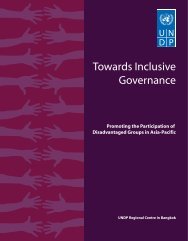Lessons Learned From Rights-Based Approaches in ... - HRBA Portal
Lessons Learned From Rights-Based Approaches in ... - HRBA Portal
Lessons Learned From Rights-Based Approaches in ... - HRBA Portal
Create successful ePaper yourself
Turn your PDF publications into a flip-book with our unique Google optimized e-Paper software.
* Network<strong>in</strong>g amongst various stakeholders.<br />
<strong>Rights</strong>-<strong>Based</strong> Programm<strong>in</strong>g Strategies Used: The capacities of all <strong>in</strong>-country<br />
stakeholders – the communities, the civil society organizations (CSOs) and the<br />
relevant public sector departments – are weak and severely constra<strong>in</strong>ed <strong>in</strong> undertak<strong>in</strong>g<br />
any form of cohesive activity (due to the factors as elaborated throughout Section 1 of<br />
this case study). Hence, UNESCO Cambodia realized that to undertake activities that<br />
can help achieve the long-term Project goal, it had to play the role of a catalyst by<br />
help<strong>in</strong>g develop capacities of its partners – the relevant public sector departments, the<br />
communities and the partner NGO – through the use of the various strategies that can<br />
be called rights-based as they i) <strong>in</strong>volve stakeholder participation; ii) taps <strong>in</strong>to the<br />
agency of the communities to have a stake <strong>in</strong> decisions that impact their lives; iii)<br />
looks at enhanc<strong>in</strong>g empowerment levels; and, iv) focuses on processes as well as<br />
outcomes (through one of the Project activities that <strong>in</strong>volves documentation of case<br />
studies). This is <strong>in</strong> addition to the agency perform<strong>in</strong>g a service-delivery role, which is<br />
equally important <strong>in</strong> this particular country context.<br />
� Tra<strong>in</strong><strong>in</strong>gs as a capacity development strategy to build stakeholder capacities:<br />
As capacity development is the key to engage and co opt stakeholders and for any<br />
<strong>in</strong>itiative to become susta<strong>in</strong>able and viable, UNSECO Cambodia focused on<br />
develop<strong>in</strong>g capacities of all key stakeholders as a key strategy from which would<br />
follow the envisaged Project outcomes. Most of such capacity development was<br />
ma<strong>in</strong>ly <strong>in</strong> the form of <strong>in</strong>tensive tra<strong>in</strong><strong>in</strong>gs that have focused on how to effectively<br />
<strong>in</strong>itiate activities as envisaged under the programme <strong>in</strong> a susta<strong>in</strong>able manner by<br />
<strong>in</strong>volv<strong>in</strong>g the participation of all stakeholders (please see the follow<strong>in</strong>g Section on one<br />
such capacity development <strong>in</strong>itiative). These tra<strong>in</strong><strong>in</strong>gs also <strong>in</strong>cluded capacity<br />
development <strong>in</strong> monitor<strong>in</strong>g and evaluation tools. Of particular <strong>in</strong>terest is the strategy<br />
of develop<strong>in</strong>g capacities of formerly illiterate <strong>in</strong>dividuals (hail<strong>in</strong>g from the former<br />
Khmer Rouge) and tra<strong>in</strong><strong>in</strong>g them as NFE and ECCE facilitators. The outcomes of<br />
such capacity development are documented <strong>in</strong> Section 4.<br />
� Enlist<strong>in</strong>g stakeholder participation via conduct<strong>in</strong>g of the basel<strong>in</strong>e surveys:<br />
Data on various <strong>in</strong>dictors related to population, gender, literacy, health, water,<br />
livelihoods and so on that adequately reflects the status and needs of the local<br />
communities is imperative and an essential element to undertake effective grassroots<br />
programm<strong>in</strong>g. Thus, as one of the first steps <strong>in</strong> the process that <strong>in</strong>volved develop<strong>in</strong>g<br />
capacities to undertake Project activities, UNSECO Cambodia helped develop the<br />
capacities of the local communities <strong>in</strong> the villages <strong>in</strong> the two communes to undertake<br />
basel<strong>in</strong>e surveys. Realiz<strong>in</strong>g that these people did not possess the capacity to undertake<br />
such surveys, UNSECO prepared the questionnaire, tak<strong>in</strong>g care to ascerta<strong>in</strong> that the<br />
survey reflects those issues that are representative of the communities. Thereafter,<br />
capacity development <strong>in</strong> the form of survey tra<strong>in</strong><strong>in</strong>g was conducted for literacy<br />
facilitators, village supervisors and commune supervisors, who prepared plans for<br />
primary data collection. These people were also tra<strong>in</strong>ed to write up the results of the<br />
village surveys. To an extent, UNSECO staff monitored the survey process as this<br />
was really the very first time that these communities were undertak<strong>in</strong>g such an effort.<br />
43



